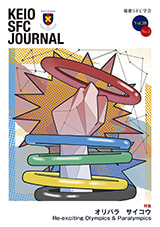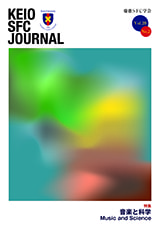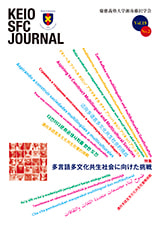- HOME
- KEIO SFC JOURNAL
- Vol.20 No.1

KEIO SFC JOURNAL Vol.20 No.1 Re-exciting Olympics & Paralympics
published on 2020.09
Olympics & Paralympics
-
Foreword
Download this article (PDF): SFCJ20-1-00.pdfJunichi Ushiyama (Associate Professor, Faculty of Environment and Information Studies, Keio University)
-
Training Science × Music Science
Download this article (PDF): SFCJ20-1-01.pdfDaichi Yamashita (Researcher, Department of Sport Science, Japan Institute of Sports Sciences) Shinya Fujii (Associate Professor, Faculty of Environment and Information Studies, Keio University) -
Swimming × Weather Science
Download this article (PDF): SFCJ20-1-02.pdfMasahiro Sumi (Senior Executive Director, Japan Swimming Federation) Yoshiaki Miyamoto (Assistant Professor, Faculty of Environment and Information Studies, Keio University) -
Sports Promotion × Human Movement Science
Download this article (PDF): SFCJ20-1-03.pdfJugo Imaizumi (Vice President Japan Sport Council) Junichi Ushiyama (Associate Professor, Faculty of Environment and Information Studies, Keio University)
-
[Research articles]
Research and Development for Paralympic Games in SFC
Yuji Ohgi (Professor, Graduate School of Media and Governance, Keio University) This paper introduces R & D examples of government-academia and industry-academia collaborations that have been assisted for Paralympic athletes. The government-academia collaboration has developed a wireless bone-conductive speaker goggle and a wall approaching detection device to support visually impaired swimmers in para-swimming. At the Para-triathlon, a wetsuit was developed and used in the Rio de Janeiro Paralympic Games. In collaboration with industry and academia, the development of 3D printer gloves used by wheelchair marathon athletes has been developing, and it is still progressing toward the upcoming Tokyo Paralympic Games.
Download this article (PDF): SFCJ20-1-04.pdf -
[Research articles]
Olympic and Sport Archive - A Institutional Theory for Preservation and Inheritance of Sport Properties, Based on IOC's Global Governance System
Tatsuki Machida (Part-time Lecturer, Faculty of Environment and Information Studies, Keio University) This paper considers a system to efficiently archive a wide variety of properties (documents, videos, databases, heritage, etc.) related to the Olympics and sport events. Specifically, following the four core elements of digital archiving mentioned in the guidelines of the National Information Standards Organization (USA), "Collection", "Object", "Metadata", and "Initiative", we examined methods for archiving properties related to the Olympics. Our results show that a globally standardized system of Olympic and sport archives can be built by utilizing the IOC's global governance system and transnational law system.
Download this article (PDF): SFCJ20-1-05.pdf -
[Research articles]
Landscape Made by Sports Games
Hajime Ishikawa (Professor, Graduate School of Media and Governance, Keio University) Hosting the Olympic and Paralympic Games involves the construction of large-scale facilities to hold the sports, which create a city-scale landscape. The reason for the scale of each facility is the specifications of the basic environment required by sports rule. Some sports are accompanied by the landscape of the region where the game was established. The facilities scale occurs due to the gap between the original landscape of the sports and the existing environment of the Olympic and Paralympic Games site. For the new Olympic and Paralympic landscape, it might be the time to consider holding the each sport in the right place.
Download this article (PDF): SFCJ20-1-06.pdf -
[Research articles]
The Geometric Theorem behind the Tokyo 2020 Olympic and Paralympic Emblem
Shohei Matsukawa (Associate Professor, Faculty of Environment and Information Studies, Keio University) In this paper, I try to reveal the geometric theorem behind the Tokyo 2020 Olympic and Paralympic emblem designed by Asao Tokoro, through the development of the system called REG (Random Emblem Generator) which I created.
Download this article (PDF): SFCJ20-1-07.pdf -
[Practice reports]
The Study of the Strategy for Strengthening Men's Artistic Gymnastics
Hisashi Mizutori (Assistant Professor, Faculty of Policy Management, Keio University) The purpose of this study is to contribute to the improvement of the skill in future gymnastics by analyzing and evaluating the strengthening strategy and the game results of the top gymnastics countries. In order to win in the world, a strategy that emphasizes perfection while raising top D score is effective. The top five countries are divided into a club-centered democratic system and a centralized system. There is a possibility that centralized Russia and China are effectively strengthening because of their high competitiveness despite their small player population. Japan needs to enhance its national team leadership and build its own hybrid strengthening system.
Download this article (PDF): SFCJ20-1-08.pdf -
[Practice reports]
"KEIO 2020 project" Initiatives on the Pre-Games Preparation Camps of the British Teams
Takayuki Inami (Senior Assistant Professor, Institute of Physical Education, Keio University) Norifumi Fukushi (Senior Assistant Professor, Institute of Physical Education, Keio University) Ayako Higashihara (Assistant Professor, Institute of Physical Education, Keio University) Naoya Nagata (Senior Assistant Professor, Institute of Physical Education, Keio University) Toshiaki Sakai (Associate Professor, Institute of Physical Education, Keio University) Yoshimasa Suda (Professor, Institute of Physical Education, Keio University) Tadashi Muramatsu (Professor, Institute of Physical Education, Keio University) Mitsuyoshi Murayama (Professor, Institute of Physical Education, Keio University) Yasushi Ishide (Professor, Institute of Physical Education, Keio University) Akiko Koyama (Teacher, Physical Education Department, Keio Girls Senior High School) Kazunori Nakagawa (Teacher, Keio Futsubu School) Keio University will join Kawasaki City and Yokohama City in hosting the pre-Games preparation camps of the British teams in the run up to the Tokyo 2020 Olympic and Paralympic Games. In this paper, we will introduce the practical activities of the" KEIO 2020 project", an organization that practices an educational program [KEIO Sports Legacy] to train student volunteers who will be active at the pre-Games preparation camps of the British teams.
Download this article (PDF): SFCJ20-1-09.pdf -
[Review articles]
Huge Potential of eSports
Takaaki Kato (Associate Professor, Faculty of Environment and Information Studies, Keio University) Tomoyuki Furutani (Professor, Faculty of Policy Management, Keio University) Masaki Minami (Project Assistant Professor, Graduate School of Media and Governance, Keio University) eSports has been rapidly developing in recent years. In this paper, we discuss about eSports from the perspective of social change history and cyber-physical system of the future world, player's perceptual-cognitive skills, and diversity of healthcare. Especially, while touching on the approach of "Understanding e-Sports" lecture held at SFC, we will give a perspective on the hidden potential of eSports for each domain to the future.
Download this article (PDF): SFCJ20-1-10.pdf -
[Review articles]
Long-Term Impacts of Paralympics Legacies - Implications from the Atlanta and Vancouver Paralympics Legacy
Hanako Kitano (Executive Director, Nonprofit Organization Being ALIVE Japan) Miki Akiyama (Professor, Faculty of Environment and Information Studies, Keio University) One of the legacy goals of the Tokyo Paralympic Games is the realization of social participation and inclusive society through sports, but it is not clear how this goal will be achieved. This article explores what should be remained and developed as the Paralympic legacy over the decades. We conducted case studies on the legacy organizations of 1996 Atlanta Games and one of 2010 Vancouver Winter Games. Both organizations have been actively developing community-based programs to empower individuals with disability through sports and recreation. The key for success was continuous resource development (i.e. funding and manpower) by forming partnership with various actors. It is important for Japan to consider empowering individuals, organizations and communities.
Download this article (PDF): SFCJ20-1-11.pdf -
[Review articles]
How to Discuss the Significance of the Olympics and Paralympics and the Value of Sports - The Future of Sports Policy Research Beyond Usefulness
Kan Hiroshi Suzuki (Professor, Faculty of Policy Management, Keio University) The 2020 Tokyo Olympics and Paralympics have been postponed. Again, in order to discuss the significance of the event and the value of sports, we will review the history of modern sports and look back on the history of the bid and the purpose of enacting the Basic Sports Law, which is closely related to the bid. In the future, when discussing these meanings and values, it should be discussed not only from usefulness but also from intrinsic values such as excellence and solidarity. It is necessary to develop the possibility of collaboration with philosophy. As an example, we will introduce the possibilities of sports research in cooperation with philosophy, such as Kitaro Nishida, Masao Maruyama, Jean-Paul Sartre, Georges Bataille, etc.
Download this article (PDF): SFCJ20-1-12.pdf
-
[Research articles]
Domestic Institutional Quality as a Factor in East Asian Regionalization
Tamás Mészáros (Doctoral Program, Graduate School of Media and Governance, Keio University) Recent research questioning the overall trade creation effects of some East Asian Free Trade Agreements calls for the investigation of the influence of other variables on regional trade. To this end, this paper examines the effects of domestic institutional quality, and the changes thereof, on trade among East Asian economies by using the gravity model of trade. The results show that domestic institutional quality has a significant positive effect on trade, which suggests that improving domestic economic governance should be prioritized in future trade agreements.
Download this article (PDF): SFCJ20-1-13.pdf -
[Review articles]
Trends of Research on Safe Patient Handling and Movement - Bibliometric Analysis
Toshiki Watanabe (Nursing Department, Keio University Hospital) Aya Yamamoto (Assistant Professor, Faculty of Nursing and Medical Care, Keio University) In this study, we investigated the trend of research on "Safe Patient Handling and Movement (SPHM)", a comprehensive program developed in the United States for preventing musculoskeletal disorders (MSD) when transferring patients. SPHM research initially focused on fact-finding and economic surveys on nurses' health hazards and social losses associated with MSD onset, followed by cost-effectiveness analyses of the introduction of patient lifters. The program was then developed and implemented; it has been evaluated and improved on a continuous basis, mainly by national organizations and affiliated researchers. Our findings suggest that SPHM research in Japan should follow a similar process to establish systems that are feasible in healthcare policies.
Download this article (PDF): SFCJ20-1-14.pdf -
[Review articles]
Current Status and Issues Related to Lower Back Pain Prevention Measures for Nurses in Japan - Focusing on No-Lift Care in the Medical Field
Ryoko Kobayashi (Research Associate, Faculty of Nursing and Medical Care, Keio University) Mihoko Miyawaki (Professor, Faculty of Nursing and Medical Care, Keio University) We examined the current status and issues related to lower back pain prevention measures for nurses in the medical field in Japan. The basics of preventive measures consist of "no-lift care," which does not involve lifting by humans. However, compared to other countries, "no-lift care" in Japan is not widespread. Currently, nurses understand the necessity of these measures but they do not have concrete effectiveness. For this reason, nurses face difficulties in organizing an appropriate environment due to physical, economic, and human resource problems. In addition, nurses themselves lack the required knowledge and awareness of the problem of back pain, and improving this knowledge is urgently needed in order to provide safe and secure care.
Download this article (PDF): SFCJ20-1-15.pdf

